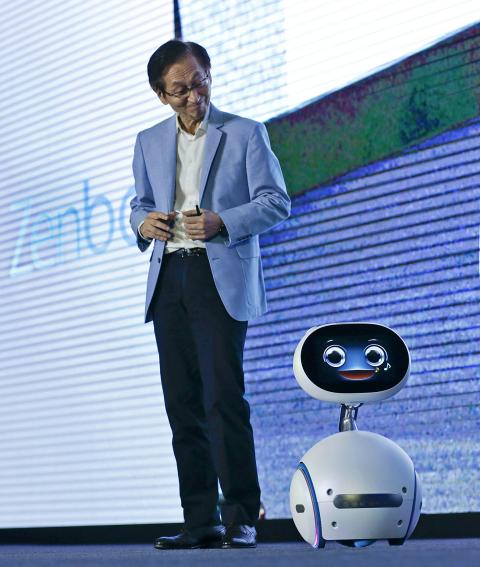Asustek Computer Inc (華碩) yesterday introduced its first voice-controlled home robot as a “smart home manager,” officially tapping into the robotic sector.
“Our ambition is to enable robotic computing for every household,” Asustek chairman Jonney Shih (施崇棠) told a news conference in Taipei.
Zenbo, which is described as a “less-cute, real-world version of Star Wars’ BB-8 droid” by tech news site the Verge, can function as a kitchen assistant, security guard, companion for seniors or children, and a photographer.

Photo: EPA
Shih called on global hardware and software developers to join Asustek’s “developers’ program” to help create applications and content for Zenbo.
“Together we can make Zenbo the best and most practical robot for every household. Together we can work on the next chapter of proactive computing,” Shih said.
Compared with SoftBank Corp’s service humanoid robot Pepper, which is priced at ¥198,000 (US$1,782), Asustek’s home robot is “shorter” and cheaper at US$599.
No release date has been announced.
Asustek chief executive officer Jerry Shen (沈振來) told reporters on the sidelines of the event that Zenbo might not hit the market before the end of the year, as there is “still work to do and some adjustments to make.”
No other information regarding the specifications or manufacturing details of Zenbo were revealed, as Shih declined to take questions from reporters after the news event.
In addition to the introduction of Zenbo, Asustek launched three new models of its third-generation ZenFoen — the ZenFone 3, ZenFone 3 Deluxe and Zenfone 3 Ultra.
The three new models are mainly powered by Qualcomm Inc’s processor, as Asustek has gradually increased adoption of chips by Qualcomm, instead of Intel’s.
The change follows Intel’s withdrawal of its subsidy plan in the first half of last year.
The 5.5-inch ZenFone 3 starts from US$249, a similar price range to the ZenFone 2.
The higher-end 5.7-inch ZenFone 3 Deluxe and 6.8-inch ZenFone 3 Ultra are priced from US$479, a move that indicates Asustek’s attempt to increase the average sale price of its ZenFone.
Shen this month told investors that the company expects its smartphone shipment momentum to pick up significantly in the second half of this year, after the launch of the ZenFone 3 series.
Asustek aims to ship a total of 25 million smartphones this year, up 25 percent from last year’s 20 million, the company said.

In Italy’s storied gold-making hubs, jewelers are reworking their designs to trim gold content as they race to blunt the effect of record prices and appeal to shoppers watching their budgets. Gold prices hit a record high on Thursday, surging near US$5,600 an ounce, more than double a year ago as geopolitical concerns and jitters over trade pushed investors toward the safe-haven asset. The rally is putting undue pressure on small artisans as they face mounting demands from customers, including international brands, to produce cheaper items, from signature pieces to wedding rings, according to interviews with four independent jewelers in Italy’s main

Japanese Prime Minister Sanae Takaichi has talked up the benefits of a weaker yen in a campaign speech, adopting a tone at odds with her finance ministry, which has refused to rule out any options to counter excessive foreign exchange volatility. Takaichi later softened her stance, saying she did not have a preference for the yen’s direction. “People say the weak yen is bad right now, but for export industries, it’s a major opportunity,” Takaichi said on Saturday at a rally for Liberal Democratic Party candidate Daishiro Yamagiwa in Kanagawa Prefecture ahead of a snap election on Sunday. “Whether it’s selling food or

CONCERNS: Tech companies investing in AI businesses that purchase their products have raised questions among investors that they are artificially propping up demand Nvidia Corp chief executive officer Jensen Huang (黃仁勳) on Saturday said that the company would be participating in OpenAI’s latest funding round, describing it as potentially “the largest investment we’ve ever made.” “We will invest a great deal of money,” Huang told reporters while visiting Taipei. “I believe in OpenAI. The work that they do is incredible. They’re one of the most consequential companies of our time.” Huang did not say exactly how much Nvidia might contribute, but described the investment as “huge.” “Let Sam announce how much he’s going to raise — it’s for him to decide,” Huang said, referring to OpenAI

The global server market is expected to grow 12.8 percent annually this year, with artificial intelligence (AI) servers projected to account for 16.5 percent, driven by continued investment in AI infrastructure by major cloud service providers (CSPs), market researcher TrendForce Corp (集邦科技) said yesterday. Global AI server shipments this year are expected to increase 28 percent year-on-year to more than 2.7 million units, driven by sustained demand from CSPs and government sovereign cloud projects, TrendForce analyst Frank Kung (龔明德) told the Taipei Times. Demand for GPU-based AI servers, including Nvidia Corp’s GB and Vera Rubin rack systems, is expected to remain high,